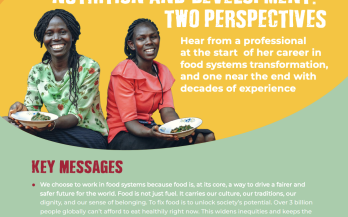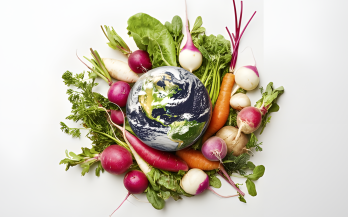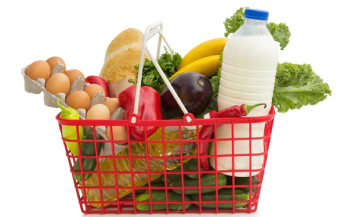- 15/10/2025
Hear from a professional at the start of her career in food systems transformation, and one near the end with decades of experience
Key Messages
• We choose to work in food systems because food is, at its core, a way to drive a fairer and
safer future for the world. Food is not just fuel. It carries our culture, our traditions, our
dignity, and our sense of belonging. To fix food is to unlock society’s potential. Over 3 billion
people globally can’t afford to eat healthily right now. This widens inequities and keeps the
vulnerable trapped in cycles of poor health.
• Food systems transformation touches every aspect of our lives and cannot be achieved in
isolation. It spans agriculture, health, trade, finance, education, environment, and social
protection, and it relies on people all along the supply chain, from farmers and traders to
processors, retailers, policymakers, and consumers. Few other areas of work demand such
breadth. That is why transforming food systems requires collaboration across sectors
directly and indirectly linked to food, and why it offers opportunities for people with
different skills, perspectives, and passions to contribute.
• The 2025 World Food Day theme calls for greater collaboration across sectors and silos to
transform agrifood systems for people and planet. This is a huge part of the work that
must be done, and we remain hopeful that solidarity and compassion will win over more
selfish politics. At GAIN we work hard to bring disparate voices across the food system
together, for real transformation.
- 14/10/2025
Through the Nourishing Food Pathways programme, GAIN has collaborated with Hystra on a new study exploring how investments in nutritious food value chains can deliver both nutrition and environmental benefits in Latin America, Sub-Saharan Africa, and South Asia. The research highlights opportunities for impact-oriented investors, specifically Development Finance Institutions (DFIs), to direct capital towards businesses that improve diets while advancing sustainable food systems.
The study prioritises six nutritious food value chains; fruits, vegetables, legumes, milk, poultry, and aquaculture, selected for their inherent nutritional value, potential to reduce environmental pressures and high investment potential. In each region, case studies of investable enterprise illustrate how targeted investments can expand access to affordable and diverse nutritious foods, reduce post-harvest losses, promote climate-friendly practices such as regenerative agriculture and circular resource use, and enhance productivity.
The report provides practical insights for DFIs and other impact-oriented investors who are committed to advancing SDG2 (Zero Hunger) and SDG13 (Climate Action). By making strategic investments in businesses operating in these value chains, investors can simultaneously reduce environmental impacts and expand access to nutritious, affordable foods in local markets, creating a virtuous cycle of sustainable growth and resilience.
- 11/10/2025
Youth in Tanzania are active at the community level but remain largely absent from formal
governance. There is potential for Tanzanian youth to more actively help Tanzania in its ambition to
achieve a nutrition-sensitive, climate resilient, inclusive food system.
- 11/10/2025
KEY MESSAGES
Children in both urban and rural Ethiopia are increasingly consuming ultra-processed foods that contain unhealthy levels of sugar, salt, and unhealthy fats. These items, heavily marketed and widely accessible, are rapidly replacing traditional healthy diets.
Inadequate and unhealthy diets during childhood can compromise physical and cognitive development, diminish immune function, and increase susceptibility to chronic illnesses later in life.
Priority policy areas the government should consider include: more nutrition education; improved regulation of the food environment to make healthy options more prominent and unhealthy options less prominent; subsidies that prioritize healthy diets for children; and improved coordination and coherence across sectors seeking to transform food systems (e.g. Agriculture, Education, Health, and Trade).
Reducing unhealthy diets in children is not just a nutrition issue – it’s a systems issue. Ethiopia must urgently implement a coordinated, multi-sectoral strategy with actions to ensure all children have access to diverse, healthy, safe, and affordable diets from the start of life.
- 11/10/2025
Global food systems generate a wide range of health, environmental, and socio-economic externalities that vary across regions, demographic groups, value chains, and production contexts. These include positive effects such as improved food and nutrition security, better air and water quality, job creation and community development, but also negative outcomes such as malnutrition and diet-related diseases, climate change and land degradation, unfair labour practices and rights violations. Yet, these costs and benefits are rarely reflected in the market price of food. To design future food systems that promote health, environmental sustainability, social equity/justice, and resilience, we must make these hidden impacts visible and act upon them.
- 08/09/2025
Stunting is a major concern in Eastern Africa, where nearly 1 in 3 children under 5, about 22.6 million, are
affected (UNICEF, WHO, Worldbank, 2023). In Kenya, the prevalence has declined to approximately one in
five children (18%), outperforming the regional average of 31.6%. However, this still represents more than
1.2 million children at risk (KNBS, Ministry of Health, ICF, 2023). The consequences are far-reaching;
stunting contributes to child mortality, vulnerability, and lifelong impairments in physical growth and
cognitive development, impacting both individual well-being and national productivity. In Kenya, child
undernutrition, including stunting as a key component, is estimated to cost the economy KES 374 billion
(approximately USD 4.2 billion) annually, equivalent to 6.9% of the GDP (Government of Kenya, 2019).
Stunting, a persistent form of long-term nutritional deprivation, acts as a silent driver of inequality, limiting
opportunities, lowering future earnings and reducing the potential to contribute equally to the economy.
Yet the returns on investment in nutrition are high, with every dollar yielding up to $22 in economic
benefit. (Eberwein, et al., 2016)
- 02/10/2025
Food culture refers to a shared value system, norms, symbols, and perceptions. Yet within the food and nutrition sector, it is often reduced to traditional foods, dishes, or cuisines—a narrow view that constrains how food culture could be leveraged to shape future food preferences and habits. This working paper reviews Indonesian food culture broadly, seeking to understand and appreciate the country’s diverse cuisine. The paper draws on data from governmental reports, academic papers, media reports, social media analysis, and expert interviews.
- 29/09/2025
The world is currently facing two interconnected and severe crises: widespread malnutrition and environmental degradation. Food systems are central to both issues, as they are responsible for a significant portion of greenhouse gas emissions, natural resource depletion, and environmental damage, while simultaneously feeding billions of people. Diets are a crucial link between human and planetary health and have been identified as a key lever to address both the climate and malnutrition crises. However, there are inherent trade-offs between nutritional and environmental goals, making it difficult to find solutions that simultaneously improve both outcomes. This paper introduces nutritional Life Cycle Assessment (nLCA) as an evidence-based tool to guide policy, programmatic, and industry decision-making, and demonstrates how nLCA can provide actionable, context-specific insights that help reconcile (often competing) nutritional and environmental priorities.
- 24/09/2025
Food policy has been an active area in the UK throughout 2025. Three of four UK nations having recently published food strategies and plans, with another in preparation, all within a changing geopolitical context. Against this backdrop, this working paper highlights key gaps and potential actions for fostering coherence within food strategies and governments in the UK based on an analysis of UK food strategies using a new tool, the Food Systems Policy Coherence (FSPC) Diagnostic tool. This tool, composed of two modules, aims to provide a simplified and standardised approach to measure policy coherence.
- 11/09/2025
While Rwanda has made notable progress in recent decades on areas linked to improved prosperity such as growth in agricultural production and poverty reduction,rates of malnutrition remain a public health concern, particularly among vulnerable groups like young children.









